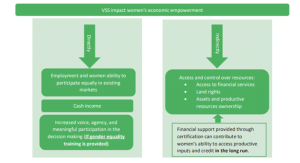The United Nations first recognized International Women’s Day in 1977, driven by the early 1900s labor movements for better working conditions and women’s right to work. Today, with the multiple global crises putting women’s roles in the labor market in flux, attention to women’s economic empowerment (WEE) has never been more urgent.
A recent report by the United Nations Conference on Trade and Development (UNCTAD) underscores the role that women play in international trade and agriculture. “Exploring the role of voluntary sustainability standards in women’s economic empowerment in the agriculture sector in developing countries” highlights how the trade tools, specifically voluntary sustainability standards (VSS) can help advance WEE in the agriculture sector. Here are some key takeaways from the report.
Women in agriculture and the role of VSS
64% of women in low-income countries and 42% in lower middle-income countries work in agriculture (Figure 1), yet they face significant discrimination in terms of ownership of land and livestock, equal pay, decision-making abilities, and access to credit and financial services. Where data is available, it indicates that despite this significant participation, women are paid less than men. Data also indicates that women in low-income countries have less access to financial resources and, globally, women only own an estimated 12.8% of agricultural land.
Figure 1. The percentage of female employment in agriculture, services and industry by income status and region in 2019 (modelled ILO estimate)

Women are important participants in the productive sector of economies and perform a wide range of economic roles. Many of these roles are affected by and affect international trade directly and indirectly, but trade policy measures are not always designed with a focus on gender equality. One category of widely used trade policy measures is VSS.
Given the widespread usage of VSS, and the role of women in agriculture and trade, it becomes imperative to understand how VSS interact with women’s economic empowerment in the agricultural sector. UNCTAD’s report elaborates that, based on a theoretical framework (Figure 2), VSS contribute to women’s economic empowerment through the channel of wages and skills upgrading.
Figure 2. The role of VSS in advancing Women’s Economic Empowerment- theoretical framework

VSS work for improving women’s wages and skills upgradation:
Most VSS follow the International Labor Organization (ILO) principles and include non-discriminatory employment practices in their criteria requirements. For example, agricultural VSS like Rainforest Alliance, Fairtrade International and Organics International have requirements for non-discrimination when recruiting workers. Some VSS also promote the uptake of activities that foster enhanced employability for women. For example, RSPO provides trainings to help women develop their careers in the palm oil sector.
It is also pertinent to note that most VSS mandate the right to minimum wages. While this does not specifically mention women, it does imply that if women are employed, they also have the same minimum wage rights as men. Linked to this is the advantage of price premiums that some VSS offer, which is an extra amount of money paid to farmers on top of the selling price. In the case of Fairtrade in Nicaragua, the premium is being used to support women’s emerging businesses. This extra income is an important resource for encouraging and promoting more gender equality programs and is being used by communities to develop schools.
WEE can be promoted by improving the decision-making ability of women through increased participation in trainings, increased representation in decision-making positions, and education access. Many standards run multiple training of businesses by providing seed-funding and other necessary resources, thus enabling partial or complete control over decisions. For example, With funding from the Better Cotton Growth and Innovation Fund, WWF-Pakistan provided women with training, seeds, tools and the equipment necessary to set up their own businesses, allowing them to run small tree nurseries on their land.
Lastly, securing land tenure is often one of the most important household assets for supporting agricultural production and providing food security in rural developing countries. In some instances, VSS adoption has led to women gaining ownership of land and/or resources. For example, Fairtrade’s Growing Women in Coffee project in Kenya encouraged the transfer of coffee bushes to women coffee farmers. As a result, three hundred women from the Kapngetuny Cooperative received training on good agricultural practices and increased the yield and quality of their coffee. This enabled them to earn an independent income for the first time.
The road ahead for leveraging VSS
UNCTAD’s report highlights that VSS have the potential to further the objectives of WEE, especially in terms of better employment conditions, financial support and increasing decision-making power. However, while VSS help fill the gap on measures to normalize gender equality, the transformation of current practices goes beyond the capacity of such market-driven tools alone. Given this, the following recommendations are key to optimize the advantages of VSS for WEE:
- Conduct training and provide technical support to raise awareness on gender equality, and on WEE in particular.
- Take into account the local context of target communities and what economic empowerment means for them when designing training and capacity building activities.
- Provide financial support to smallholder women and women’s cooperatives to adopt and utilize VSS, since the cost of certification can be a major barrier in VSS uptake.
- Include women as partners in designing and implementing VSS, and assign women as essential beneficiaries of VSS outcomes.
- Support the establishment of women’s producer organizations to strengthen the voice of women within the value chain.
Every year on International Women’s Day global dialogues surface that talk about how to elevate conditions for women and create a world that’s diverse, equitable, and inclusive. With global crises pushing these goals further from achievement, there is now a pressing need to translate these dialogues and recommendations into action. Tools such as VSS can be leveraged as a concrete action to enhance WEE.
Read the full UNCTAD report at: https://unctad.org/system/files/official-document/ditctab2022d5_en.pdf